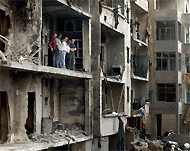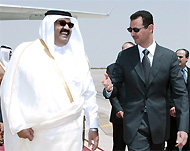Qatar pledges support to Lebanon
The emir of Qatar has pledged aid for reconstruction efforts in Lebanon has he took a first-hand look at the devastation wreaked by Israeli air strikes on the country.

In the first visit to Lebanon by any head of state since the conflict began, Sheikh Hamad Bin Khalifa Al-Thani said on Monday that the 34-day war had provided greater opportunity for Middle East peace.
The Israeli-Hezbollah conflict proved that Israel could not intimidate the Arabs, he said, urging the Jewish state to implement the latest UN Security Council ceasefire requirements.
“I believe that there is greater opportunity for peace, more than before,” he said at a news conference with Emile Lahoud, the Lebanese president.
‘Arab victory’
“As far as the Israelis are concerned, they used to be able to subjugate the Arabs by military force. Now this is no longer possible after what happened in south Lebanon.”
Hezbollah fighters’ ability to withstand the incessant Israeli air strikes and to inflict losses on Israeli armour and casualties among Israeli troops in south Lebanon – while continuing to fire rockets at northern Israel – was widely seen in Lebanon and the Arab world as a success after previous wars humbled the Arab armies.
“The Lebanese people and its resistance have achieved the first Arab victory, which we have wanted for long years,” said Sheikh Hamad, whose moderate Arab government has had contacts with Israel but does not have full diplomatic relations.
Oil embargo
Before leaving Beirut for France, Sheikh Hamad, accompanied by Lebanese officials including Lahoud, visited Beirut’s southern suburbs, which were heavily devastated by Israeli air strikes.
 |
|
Residents in southern Beirut |
The emir touched, although ambiguously, on the question of Arabs employing an oil embargo as a means of supporting Lebanon and pressuring the West to rein in Israel.
“If the oil weapon [embargo] was used it would have served the Lebanese interest, but unfortunately it was not used,” he said in response to a question about whether the day would come when the Arabs again could unite behind such a tactic, as they did successfully in the 1973 Middle East war.
Pledge
“Qatar is ready to help Lebanon, in the Arab world and in the Security Council,” the emir said, without specifying what aid his country would give.
On Saturday, Nabih Berri, the speaker of the Lebanese parliament, said he had received a pledge from Qatar to rebuild Bint Jbail and another southern town, which Lebanese newspapers identified as Khiam, near the border with Israel.
Qatar has a non-permanent seat on the United Nations Security Council and has pushed Lebanon’s interests in negotiations to approve a French-US draft resolution.
“The faster we move toward peace, the better it is for the region,” the emir said on Monday. “We always seek peace in the region.”
Blockade
He urged Israel to lift its naval and air blockade of Lebanon in line with the requirements of the ceasefire resolution, disclosing that even his flight had to have clearance from the Israelis before landing in Beirut.
“So that we get to Beirut, Israel must approve,” he said. “Any plane that comes here, the Israeli control tower must approve it. We are not shy about this but we hope in the future this subject [blockade] is removed and that Israeli implements the latest Security Council resolution. This is what we ask for.”
 |
|
Sheikh Hamad arrived in Lebanon |
Sheikh Hamad rejected the Israeli contention that the blockade was to prevent Hezbollah from rearming, saying Lebanon has the same rights to self-defence as Israel.
“We are for any country defending its territory and establishing its own state,” he said.
“I believe it is unacceptable that arms are banned to the Lebanese and allowed to the Israelis. He who believes in this theory wants to place Lebanon in a cage so that it could be easy prey for Israel at any time.”
He also declared that Israel’s commando raid deep inside Lebanon on Saturday was a violation “that did not conform with latest Security Council resolution”.
Invitation
Sheikh Hamad, who flew in from Syria, denied that he was mediating between Damascus and Israel.
“Had we been asked to undertake a mediation between Israel and Syria we would have announce it,” he said.
He said he was carrying an invitation from Bashar al-Assad, the Syrian president, to Fuad Siniora, the Lebanese prime minister, to visit Damascus “any time”.
Relations between the Western-backed Siniora and Damascus have deteriorated since last year’s assassination of Rafiq al-Hariri, the former prime minister of Lebanon.